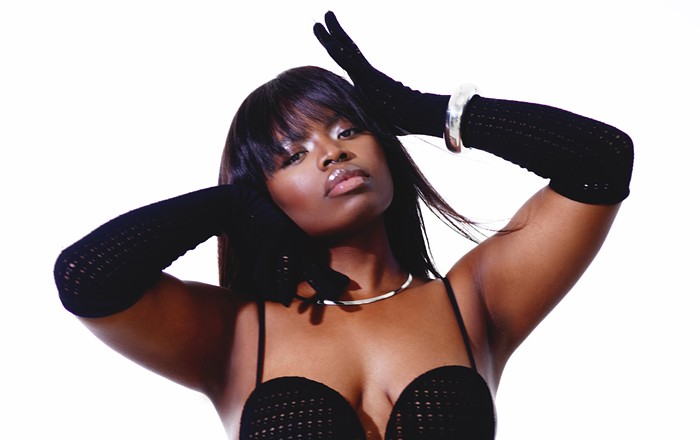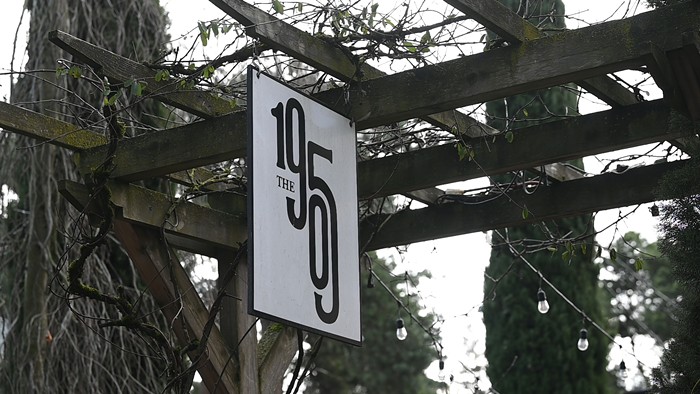THE CROWD PACKED themselves among the trees and hay bales that surrounded the dry creek bed in the center of the naturally occurring bowl, surrounded on three sides by gentle slopes of forest. Five musicians perched on the little stage, and the warm afternoon sun peeked through the canopy of leaves. Compulsively dancing feet kicked up thin swirls of dust from the ground. It could have been the setting, or the overall good vibes of the weekend, but the music sounded astonishingly, almost unbelievably good—laidback, but still heavily swaying with momentum. The sound had somehow harnessed the ecstatic moods of everyone in that forest into one enormous whoosh. It was a breathtakingly good rock 'n' roll show.
That was the scene at the Woods Stage at this summer's Pickathon, when Fruit Bats—back for their second year at the annual Portland-area music festival—took their turn on the tiny forest stage. There wasn't a soul in attendance who wasn't blown away, and the group's power was all the more striking in that it was among the very first public performances by the band's new lineup. Guitarist Nathan Junior and keyboardist/guitarist Dave Depper had joined only weeks before, but Fruit Bats already sounded like a well-oiled powerhouse.
The band—which also includes drummer Graeme Gibson and bassist Ron Lewis—wasn't always such a successful live endeavor, according to frontman Eric D. Johnson, who began Fruit Bats as a one-man recording project. "When I first made Echolocation in 2001, I didn't know how to put together a live band, so it was always a very slapdash thing. I was always like, 'Why are we bad live?'" Johnson says. "But I put together things now with the thought of a live show. For the past three or four years, it's been way more of a thing that I think about, not caring if it sounds like the record or not.
"Those records were such four-tracky, sitdown, weird headphone affairs that it was completely impossible to recreate. So when those Dylan Rolling Thunder Revue live shows got released, I was like, 'Oh my god, this is what you should do,'" he continues, referring to Bob Dylan's 1975-1976 tour. That jaunt saw Dylan fronting a free-form live band that willfully reinvented the songwriter's old folk chestnuts, with fluid but powerfully rocking results. "There's always this very unrealistic arrangement process for me," Johnson adds, "so I went with the Rolling Thunder Revue, which was built for power... and that's what I did. And that's kind of what we have. There's power, but then continually trying to dial back the power, too, so it doesn't overpower the songs themselves."
The current live incarnation of Fruit Bats is already markedly different from what appears on the newest Fruit Bats album, Tripper. That record was recorded with Gibson, Lewis, and guitarist Sam Wagster on the basic tracks, but Johnson spent weeks overdubbing and refining the record on his own. It contains the backbones of Fruit Bats' current sound—the opener "Tony the Tripper" is a shimmering, steadily building stomper that sounds exquisite on record and positively explosive in the hands of the new live band—but Tripper also contains a wide array of territory. There's the Bee Gees-esque folk-disco of "You're Too Weird" and "The Banishment Song"; the fiercely strummed triplets of "Heart Like an Orange"; the quiet, haunting, and sorrowful "Wild Honey," a cover of a song by Johnson's friend Diane Izzo, who died during recording. It's Fruit Bats' best recorded work, a pop album that's filled with both grace and steam.
"I never wanted to have a normal job when I was younger," Johnson says. "I wanted to direct movies or write books or something like that. I always had kind of a creative jones, and I didn't come from a family where anybody did that, so I really didn't know how to do it. I just knew that I wanted to. Being 35 now and 10 years in, all of my friends have either totally made it and have done really, really well—that's like a third of them, I guess—and a third of them have completely dropped off because they can't do it anymore. And then there's me, the third who are still kind of cobbling something together. I've always said my whole music career has just been me crouching in the bushes—with a sort of patience, you know, where I just held my breath under the pool long enough, so I've been slightly rewarded for that."



















